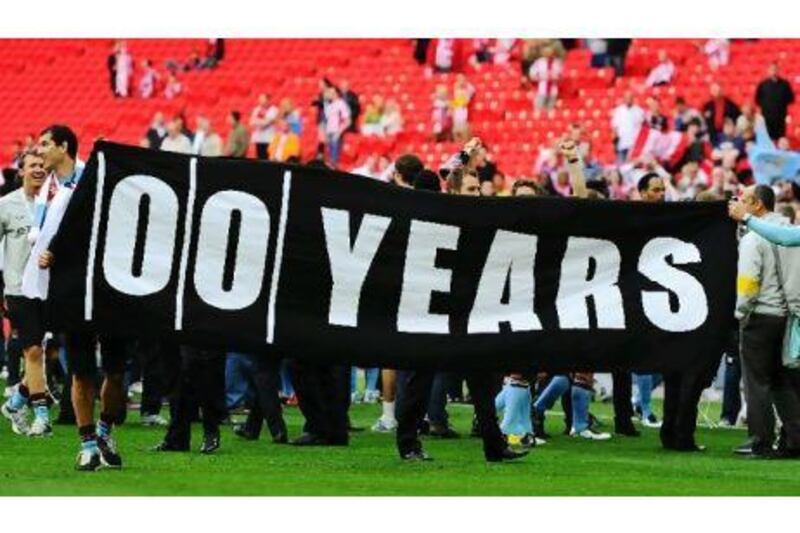History, Winston Churchill said, is written by the victors. It is a theory that Sir Alex Ferguson has expanded upon, the phrases he coined enabling the contemporary chronicling of the losers displaced by Manchester United's winning habit.
Wesley Sneijder's England move unlikely
The Inter Milan playmaker's wage demand is too high, and neither United nor City are willing to break salary structure, throwing transfer window wide open.
Transfer talk: Chelsea yet to agree a deal for Lukaku. Read article
Faith, hope and not much charity in Community Shield. Read article
Manchester United and City are in the Community spirit. Read article
Manchester City have suffered particularly from Ferguson's contributions to the football lexicon.
A gleaming new stadium was branded "The Temple of Doom", the implied antithesis of United's "Theatre of Dreams"; signs of City's ambition led Ferguson to brand them "noisy neighbours".
United's enmity with Liverpool and Leeds United can be as visceral and as vitriolic, but City's status enabled Ferguson to be most disparaging about them.
The United support were willing conspirators, their Stretford End banner taunting City about a 35-year wait for silverware that was ended in May's FA Cup final.
The selfsame day, Ferguson achieved a feat of astonishing endurance and determination by, to borrow another of his idioms, knocking Liverpool off their perch with May's record 19th league title.
If United sit uneasily on their perch, it is perhaps because the principal danger is posed by City.
While the Etihad Stadium is rarely noted for doom and gloom these days, Wembley has become City's theatre of dreams.
Last season's FA Cup semi-final and final victories were notable for the noise that was all the louder because of lengthy anticipation of something to celebrate.
The national stadium, which today stages the Community Shield clash between the Manchester rivals, can be a deluxe destination for serial winners, as United can testify.
Yet Wembley has contained disappointments for them of late, April and May defeats to City and Barcelona turning a potential treble into a season of a solitary, albeit hugely significant, trophy.
However, that the league was captured on the day City defeated Stoke in the FA Cup final enabled many on the red side to maintain their sense of superiority.
There are times City have won individual skirmishes, but lost the war; in 2009/10, a Carling Cup semi-final first-leg win was nullified by a second-leg defeat; in the 2007/08 season, raucously celebrated home-and-away wins were put into perspective when United became Champions League winners.
While a definitive judgement can only be made in hindsight, today matters, in part, because it might signify the start of a new era.
As Roberto Mancini acknowledges, his side have a slight disadvantage.
"Manchester United are on top at the moment," the City manager said. "They are a strong team, they won the Barclays Premier League and have bought four or five good players. I think we are very close, but at the moment they are above us."
But after the years of lopsided, even one-sided, rivalry, Manchester's clubs might almost be deemed equals. London, the political and financial centre of the UK, hosts today's game, but there are signs that the footballing hub is some 200 miles farther north.
A battle that began in their own backyard is being fought on a micro and macro scale. Perhaps only Milan currently has experience of this, a two-club city divided down the middle with a contest for both domestic and European supremacy.
It is something United have achieved and City merely envied, but as the mockery ceases, they are being treated with greater gravity, and being thought of as challengers, not a comedy routine.
As Ferguson said: "We accept that challenge and it's good for us. It keeps complacency from the door and we carry on as best as we can."
Complacency is averted, too, by recruitment. The notion that these two clubs may be on level footing is underlined by the transfer market. While both clubs have recouped money, their expenditure comes to around £50 million (Dh300m) each.
The days when City could be portrayed as extravagant spenders are nearing an end, especially as, in Sergio Aguero, they have a bona fide superstar to show for their outlay.
The other side of the equation is that while Ferguson is deprived of the services of two world-class talents, in Edwin van der Sar and Paul Scholes, age dictated their departure. City, in contrast, could yet lose Carlos Tevez. Following his exertions at the Copa America, the Argentine will be absent today. His non-attendance could become a permanent problem.
Yet the bar has been raised in his first two years on the blue half of Manchester. Along the way, Ferguson's ridiculing has given way to a different type of rhetoric. His comments hint at the increased competition.
That is progress, but just how much City have made depends, in part, on United's ability to lower the volume and restore a sense of despondency.






